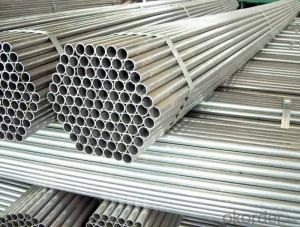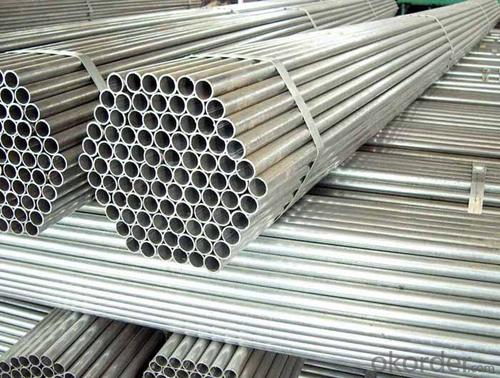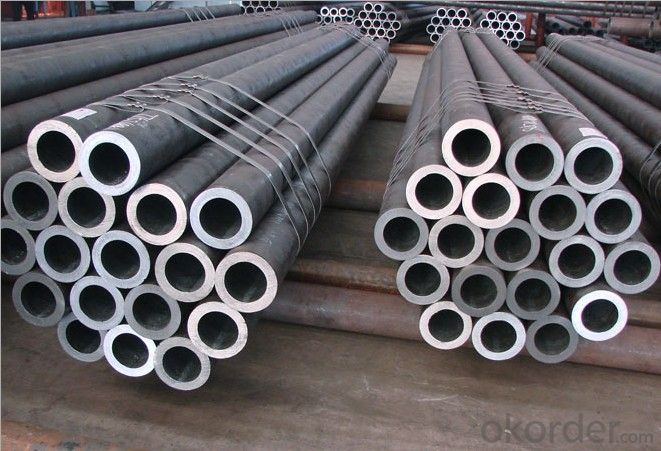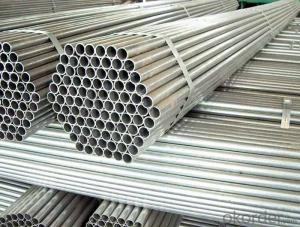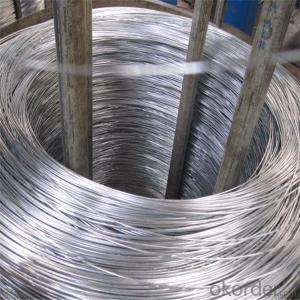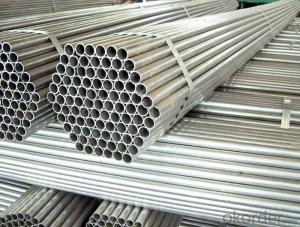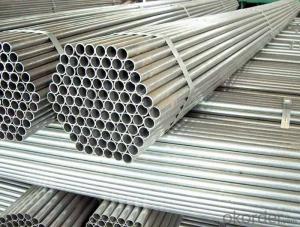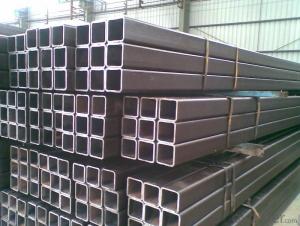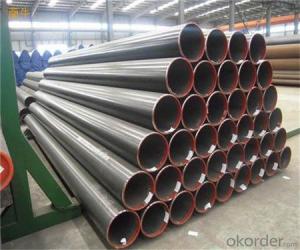Galvanized Steel Pipe BS, JIS, GB, DIN, API
- Loading Port:
- Tianjin
- Payment Terms:
- TT or LC
- Min Order Qty:
- 20 m.t.
- Supply Capability:
- 15000 m.t./month
OKorder Service Pledge
OKorder Financial Service
You Might Also Like
We are company that have many years experience and professional manager team and engineer team and sales team, sure we will provide you high quality of pipe and professioanl service.
Seamless pipe possesses a hollow section and without seam around the strip steel. It is made with solid bar or steel ingot by perforating machine. As the facture process does not include any welding, seamless pipes are considered to be stronger and more durable. Generally speaking, seamless pipe has better pressure resistance and security than other classifications, and was usually more easily available than welded pipe.
2、Main Features of the Seamless Pipe:
• High working accuracy
• High strength
• Small inertia resistance
• Strong therming dissipine ability
• Good appearance
• Reasonble price
3、Seamless Pipe Specification:
Standard | GB, DIN, ASTM ASTM A106-2006, ASTM A53-2007 |
Grade | 10#-45#, 16Mn 10#, 20#, 45#, 16Mn |
Thickness | 8 - 33 mm |
Section Shape | Round |
Outer Diameter | 133 - 219 mm |
Place of Origin | Shandong, China (Mainland) |
Secondary Or Not | Non-secondary |
Application | Hydraulic Pipe |
Technique | Cold Drawn |
Certification | API |
Surface Treatment | factory state or painted black |
Special Pipe | API Pipe |
Alloy Or Not | Non-alloy |
Length | 5-12M |
Outer Diameter | 21.3-610mm |
Grade | 20#, 45#, Q345, API J55, API K55, API L80, API N80, API P110, A53B |
Standard | ASME, ASTM |
1) Material:20#(ASTM A 106/A53 GRB.API5LGRB,GB),45#,16Mn,10#.
2) Specification range: OD: 21.3-610mm, WT:6-70mm, length:6-12m or according to the requirement of clients.
3) Executive standards: GB, ASME API5L.ASTM A 106/A53,Despite of the above standards, we can also supply seamless steel pipe with standard of DIN, JIS, and so on, and also develop new products according to the requirements of our clients!
4) Surface: black lacquered, varnish coating or galvanized.
5) Ends: Beveled or square cut, plastic capped, painted.
6) Packing: bundles wrapped with strong steel strip, seaworthy packing.
4、Packaging & Delivery:
Packaging Details: | seaworthy package, bundles wrapped with strong steel strip |
Delivery Detail: | 15-30days after received 30%TT |
5、FAQ of Seamless Pipe:
①How is the quality of your products?
We have many years business experience in this area, and we have professional engineer and manager team and sure we can provide you high quality production and professional service.
②How about price?
Yes, we are factory and be able to give you lowest price below market one, and we have a policy that “ for saving time and absolutely honest business attitude, we quote as lowest as possible for any customer, and discount can be given according to quantity”,if you like bargain and factory price is not low enough as you think, just don’t waste your time.Please trust the quotation we would give you, it is professional one.
③Why should you chose us?
We can give you both.Additionally, we can also offer professional products inquiry, products knowledge train(for agents), smooth goods delivery, exellent customer solution proposals.Our service formula: good quality+good price+good service=customer’s trust
SGS test is available, customer inspection before shipping is welcome, third party inspection is no problem.
6、Seamless Pipe Images:
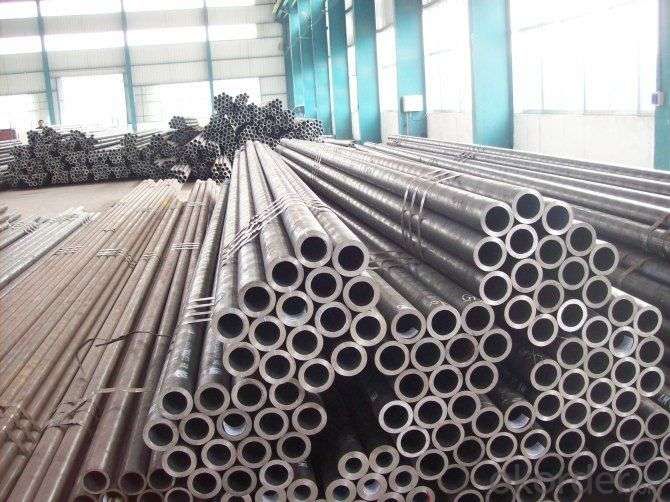
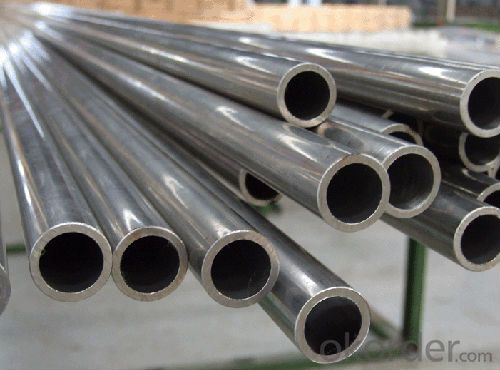
- Q: How are steel pipes classified based on their schedule?
- Steel pipes are classified based on their schedule, which refers to the thickness of the pipe wall. The schedule classification is denoted by a number, such as 10, 20, 40, 80, etc., with higher numbers indicating thicker walls.
- Q: What are the different end finishes available for steel pipes?
- There are several different end finishes available for steel pipes, depending on the specific application and requirements. Some of the most common end finishes include: 1. Plain End: This is the simplest and most common type of end finish, where the pipe ends are cut square and left plain without any additional treatment or threading. 2. Beveled End: A beveled end is an angled cut made at the end of the pipe, usually at a 30-degree angle. This allows for better welding and ensures a smooth transition between pipes. 3. Threaded End: Threaded ends are commonly used for pipes that need to be connected with other components using threaded fittings. The ends of the pipe are cut with external threads, allowing for easy assembly and disassembly. 4. Coupling End: Similar to threaded ends, coupling ends have internal threads instead of external threads. This allows for the connection of pipes using couplings or connectors. 5. Grooved End: Grooved ends are commonly used for pipes in fire protection systems or other applications that require quick and easy installation. The ends of the pipe are grooved, and then a coupling is used to connect and secure the pipes. 6. Flanged End: Flanged ends have a flat, wide surface with holes for bolts. This type of end finish is used when the pipe needs to be connected to other components using flanges, such as in piping systems or equipment connections. Each of these end finishes serves a specific purpose and is chosen based on the requirements of the application. The end finish selected will depend on factors such as the type of connection needed, the pipe's intended use, and the specific industry standards and regulations that apply.
- Q: Can steel pipes be used for hydronic heating systems?
- Yes, steel pipes can be used for hydronic heating systems. Steel pipes are commonly used in hydronic heating systems due to their durability, high temperature resistance, and ability to handle high pressure. They are suitable for both residential and commercial applications and can efficiently transport hot water or steam throughout the system.
- Q: Can steel pipes be used for pharmaceutical manufacturing plants?
- Yes, steel pipes can be used for pharmaceutical manufacturing plants. Steel pipes are known for their durability, strength, and resistance to corrosion, making them suitable for transporting various fluids and chemicals used in pharmaceutical production. Additionally, steel pipes can be easily sanitized and meet industry standards for cleanliness, making them a reliable choice for pharmaceutical manufacturing facilities.
- Q: What is the role of steel pipes in power plants?
- Steel pipes play a crucial role in power plants as they are used for transporting various fluids, such as water, steam, and fuel, throughout the facility. They provide a durable and reliable means of conveying these substances under high pressure and temperature conditions, ensuring efficient energy generation and distribution. Additionally, steel pipes are essential for the cooling systems in power plants, allowing for the safe transfer of heat from the facility to the environment.
- Q: What are the different methods of pipe repair for steel pipes?
- There are several methods for repairing steel pipes, including spot repair, slip lining, pipe bursting, and pipe relining. Spot repair involves cutting out and replacing a small section of the damaged pipe. Slip lining involves inserting a smaller diameter pipe into the existing pipe to reinforce it. Pipe bursting involves breaking the old pipe while simultaneously installing a new one. Pipe relining involves inserting a liner into the damaged pipe and then curing it in place to create a new, seamless pipe within the existing one. The choice of method depends on the extent and location of the damage, as well as budget and time constraints.
- Q: Can steel pipes be used for sewage systems?
- Yes, steel pipes can be used for sewage systems. Steel pipes are durable, strong, and resistant to corrosion, making them suitable for carrying sewage. However, they may be more expensive than other materials and require proper coating to prevent rusting.
- Q: What are the different types of steel pipe elbows?
- There are various industries and applications that commonly utilize different types of steel pipe elbows. These types encompass: 1. 90-degree elbows: Employed when redirecting fluid or gas flow requires a sharp 90-degree bend. They find extensive use in plumbing, construction, and industrial piping systems. 2. 45-degree elbows: Similar to 90-degree elbows, these elbows alter flow direction, but with a smaller angle. They are suitable for situations requiring a more gradual change in flow direction. 3. Long radius elbows: Differing from standard elbows, long radius elbows possess a larger curvature radius. This design minimizes fluid friction and pressure drop, making them ideal for applications necessitating smoother flow, such as high-flow systems or those involving viscous fluids. 4. Short radius elbows: In contrast, short radius elbows feature a smaller curvature radius. They are generally utilized in confined spaces where a compact design is essential, although they may lead to increased fluid friction and higher pressure drops. 5. Reducing elbows: These elbows are ideal for connecting pipes of varying diameters. With one end having a larger diameter and the other end with a smaller diameter, they enable a seamless transition between two pipes of different sizes. 6. Mitered elbows: Mitered elbows are tailor-made elbows fabricated by cutting and welding multiple pipe sections at specific angles. They are frequently employed when standard elbows cannot accommodate the required angle or when a unique design is necessary. In conclusion, the selection of the appropriate type of steel pipe elbow depends on factors such as the specific application, fluid flow requirements, space limitations, and compatibility with the piping system.
- Q: What is the maximum temperature that steel pipes can handle?
- The maximum temperature that steel pipes can handle depends on the specific grade of steel being used. However, most common steel pipes can withstand temperatures up to around 1000 degrees Celsius (1832 degrees Fahrenheit) without significant structural damage.
- Q: What are the different methods of insulating steel pipes?
- There are several different methods of insulating steel pipes, depending on the specific needs and requirements of the application. Some of the common methods include: 1. Insulation wraps: This method involves wrapping the steel pipes with insulating materials such as fiberglass, mineral wool, or foam insulation. The insulation is then secured with adhesive or tape to ensure a tight and secure fit. Insulation wraps are cost-effective and relatively easy to install, making them a popular choice for many applications. 2. Insulation coatings: This method involves applying a layer of insulating material directly onto the surface of the steel pipe. The coating can be made from materials such as epoxy, polyurethane, or polyethylene. Insulation coatings are ideal for situations where the pipes are exposed to harsh environments, as they provide a protective barrier against corrosion and temperature fluctuations. 3. Insulation jackets: This method involves using pre-fabricated insulation jackets that are designed to fit over the steel pipes. These jackets are typically made from a combination of insulation materials and a weatherproof outer layer. Insulation jackets are commonly used for outdoor or exposed pipelines, as they provide excellent insulation and protection against external elements. 4. Insulation foam: This method involves injecting foam insulation into the cavity between the steel pipe and an outer casing. The foam expands and hardens, creating a sealed and insulated layer around the pipe. Foam insulation is highly effective in preventing heat loss or gain, and it also provides excellent soundproofing properties. 5. Insulation tapes: This method involves using specialized insulation tapes that are wrapped around the steel pipes. These tapes are typically made from materials such as PVC or rubber, which have good insulating properties. Insulation tapes are often used for smaller pipes or joints, as they provide a flexible and easy-to-apply solution. It is important to consider factors such as the operating temperature, environmental conditions, and specific requirements of the application when choosing the appropriate method of insulating steel pipes. Consulting with a professional or insulation specialist can help in determining the most suitable insulation method for your specific needs.
Send your message to us
Galvanized Steel Pipe BS, JIS, GB, DIN, API
- Loading Port:
- Tianjin
- Payment Terms:
- TT or LC
- Min Order Qty:
- 20 m.t.
- Supply Capability:
- 15000 m.t./month
OKorder Service Pledge
OKorder Financial Service
Similar products
Hot products
Hot Searches
Related keywords
